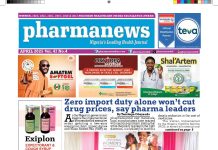What’s in store at this year’s World Congress of Pharmacy and Pharmaceutical Sciences? Michael Anisfeld, president of the International Pharmaceutical Federation’s Industrial Pharmacy Section, provides pharmacists with a preview of the programme.
If you keep your head buried in your work, you will miss the bigger picture of how your work fits into real-world patient needs. If you do not expand your horizons, your career will be very much the poorer.
The International Pharmaceutical Federation’s 2015 annual congress of pharmacy and pharmaceutical sciences will enable industrial pharmacists, pharmaceutical scientists, practitioners, researchers and academics from all over the world to delve into the issue of working towards the best possible pharmacy practice, which should be based on pharmaceutical sciences and evidence driven. This especially includes the practice area of industrial pharmacy.
The federation’s Industrial Pharmacy Section(IPS) has planned a number of stimulating sessions for the congress, covering a wide range of areas, from quality assurance to social responsibility.
Social media impacts on drug development
In the news recently was a story that the British Army is setting up a new unit that will use psychological operations and social media to help fight wars “in the information age”. Just as the armed forces cannot afford to ignore social media, neither can pharmacists. In all sectors, community, hospital or industry, pharmacists need to get acquainted with the rapid changes and adapt to quick communication and more transparency in the whole health care system.
A session, “Transparency and social media — the pharmacist as the spider in the web”, will explore the role and implications of this rapidly growing channel of communicationin new drug development, including planning and performing clinical trials. For example, what would happen if patients traded details of their clinical trial experiences on social media, potentially unblinding a trial? Issues such as these will be discussed during the session.
Customised medicines
Another growing area is the demand by patients and doctors for customised medicines, not least because of increasing drug shortages all over the world. The session, “Compounding — a core competence for the pharmacist”, will look at compounding at community, hospital and industrial levels and participants will be able to hear, among others, speakers from the Central Laboratory of German Pharmacists Association (Zentrallaboratorium), which was founded in 1971 with the aim of increasing safety, through the testing of medicines.
Presentations will include “Assuring the microbiological quality of individual preparations” and “External quality control and certification of the pharmaceutical quality management system — the German way”.
Big questions
“Medicines for all” has been a World Health Organisation and FIP mantra for over two decades. But this eminently laudable goal is yet to be achieved. A session, “Medicines for all — what is hindering progress?”, will look at the impediments to achieving our goal. Are these obstacles in drug development, clinical trials, drug usage patterns, drug pricing, logistics, product development, social norms or national health policies?And how are they preventing at-risk populations worldwide from having access to medicines? These are big questions that deserve attention.
“An often debated topic is, to what extent the international pharmaceutical industry have a responsibility to make medicines available for all; this session will explore the extent of that responsibility,” says speaker Ulf Janzon (FIP IPS, Sweden). During the session, potential solutions will be discussed.
Packaging and information essentials
The FIP congress is an international meeting of professionals, bringing together around 220 speakers from 40 countries, and is attended by thousands of pharmaceutical colleagues. Perhaps, then, it is fitting that the IPS has jointly organised a session called, “Lost in translation — preserving scientific knowledge across languages.”
During this session, industrial pharmacists will be able to look into how linguistic translation impacts the proper use of medicines. For example, are patientsat risk due to poor translation of patient package inserts? And should we be using pictograms to enhance patient compliance with drug regimens?
But translation is much more – scientific translation is a key to scientific communication, enabling research and findings to cross linguistic borders and facilitates exchange and understanding. Translation involves much more than simply transferring the words into another language. It requires research, thorough understanding of both the original and target languages, cultural knowledge, and specific training on the topic to be translated. Focus will be given to who judges if the translations received are really adequate and the economic profile of scientific translation.
Site visits and latest research
Each year, the IPS organises a number of fantastic industrial insights in the congress host country. A visit to Johnson & Johnson’s manufacturingsite is an outing especially designed for students; but the section plans to offer other visits to state-of-the-art facilities. Specific locations will be revealed as these plans are finalised.
The congress is also the place to hear short oral presentations from industry pharmacists on research in progress. Come and find out what others are doing and be inspired!
Wider perspective
Novel perspectives on industry topics from around the world are to be heard at the FIP congress. But it is amazing just how much you can learn from hearing from other cultures and about other approaches to topics from other sectors of pharmacy.
For example, if you had drifted into one of the Military and Emergency Pharmacy Section sessions at the Bangkok Congress last year, you would have heard a remarkable discussion on how Tokyo is planning the drug supply chain in preparation for the next earthquake, which is estimated to negatively impact over 30 million people. Startling food for thought, especially when you ask what your home city is doing in its emergency preparedness efforts against future disasters, and the role you can play. The preliminary congress programme for 2015 is now available, and offers 230 hours of sessions (go to www.fip.org/dusseldorf2015).
When and where?
The 2015 World Congress of Pharmacy and Pharmaceutical Sciences will take place in Germany. If you come to Düsseldorf from 28 September to 3 October this year, no matter where you are from, you will be surprised at how much you have in common with your other pharmacy colleagues, how much you will learn, and how your career will be enhanced.











